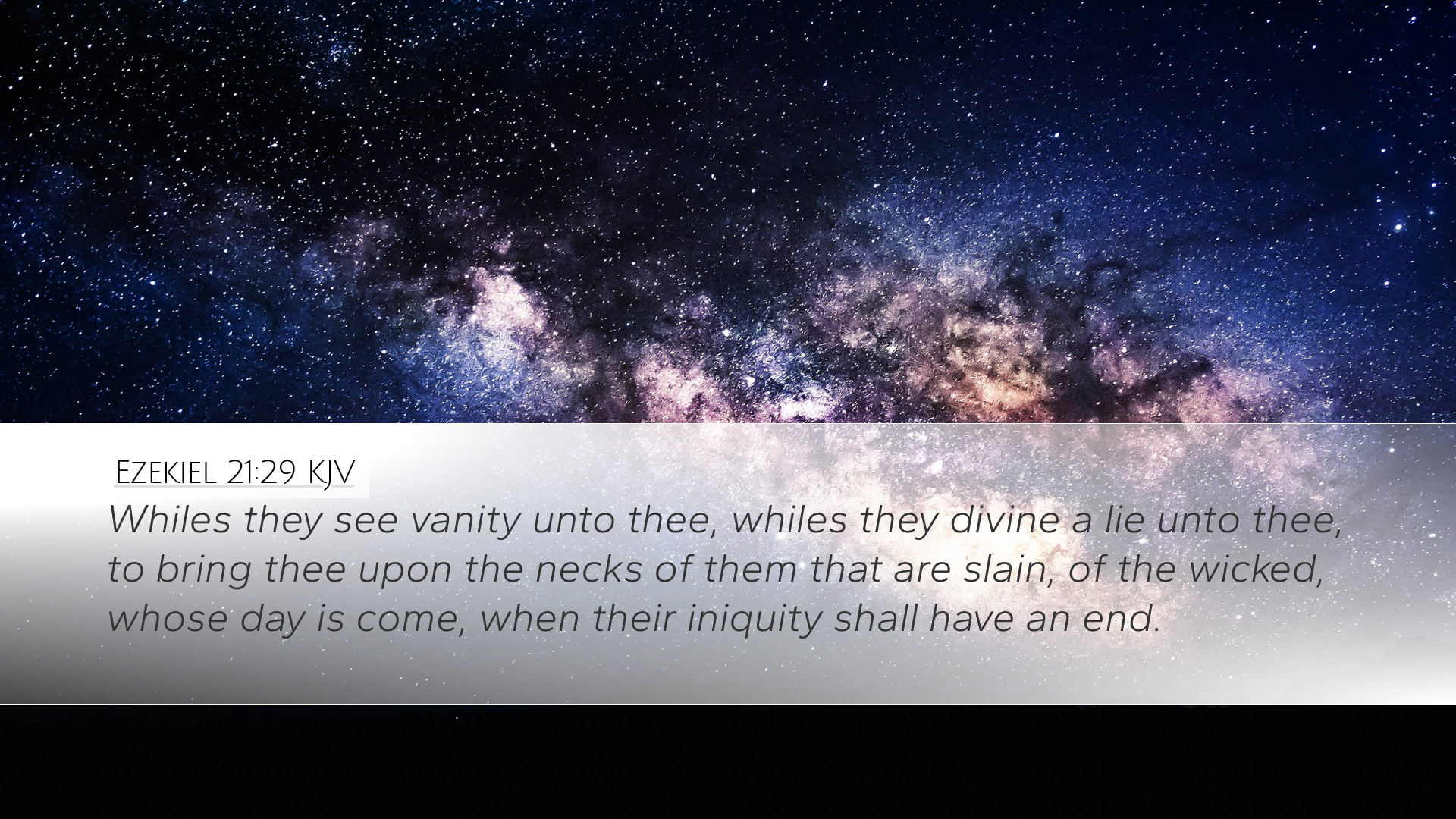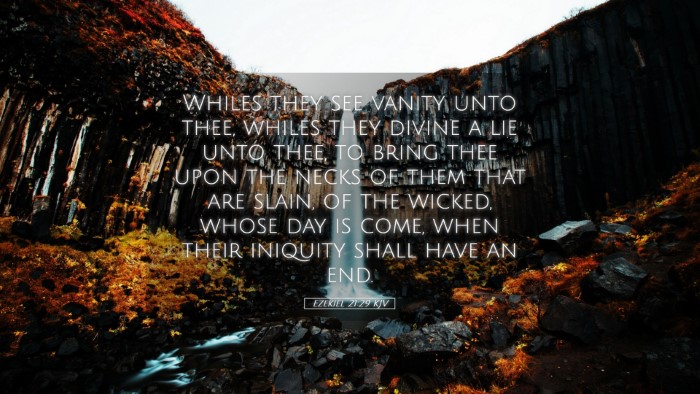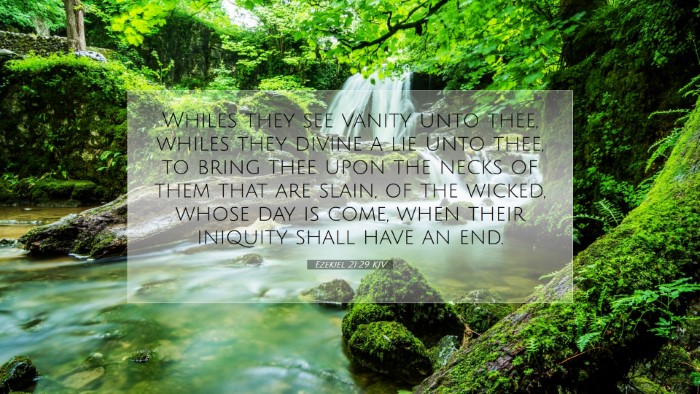Ezekiel 21:29 - Bible Commentary Summary
The verse Ezekiel 21:29 states:
"While they see vanity unto thee, while they divine a lie unto thee, to bring thee upon the necks of them that are slain, of the wicked, whose day is come, when their iniquity shall have an end."
This verse comes from a larger context in Ezekiel, where the prophet is conveying God's judgment upon the nation of Israel and its enemies. Throughout the chapter, the themes of divine judgment, the significance of prophetic revelation, and the response of those under judgment come into sharp focus.
Contextual Analysis
Ezekiel 21 deals with the impending judgment of Jerusalem and the surrounding nations. As we unpack the text, it is vital to consider the historical and cultural circumstances that provoked such severe prophetic utterance. The passage highlights:
- The Beliefs of the People: The mention of "vanity" suggests that the people, including leaders and soothsayers, were engaged in deceptive practices, believing lies rather than the truth of God.
- The Role of Prophecy: Prophecy in this context serves as a divine warning of upcoming calamity, emphasizing the importance of truthful prophetic voices amidst deception.
- The Concept of Divine Justice: The phrase "while they divine a lie" underscores the contrast between human error and divine perfection; God's judgment is based on moral reckoning rather than human opinion.
Commentary Insights
Matthew Henry
Matthew Henry emphasizes the foolishness of relying on false prophets and the consequences of ignoring God’s warnings. He interprets the “vanity” referred to in the passage as the empty promises and falsehoods of the prophets who mislead the people.
He also discusses how these false assurances lead people to a state of spiritual lethargy, preventing them from recognizing the impending judgment.
Albert Barnes
Albert Barnes takes a more detailed approach to the prophetic imagery used in this verse. He notes that "the necks of them that are slain" signifies the ultimate downfall of both the wicked and the nation that persists in its sinful ways. Barnes stresses the inevitability of divine retribution; he asserts that the "day" of judgment cannot be postponed indefinitely.
Furthermore, he elaborates on the implications of “iniquity,” drawing attention to the fact that sin carries with it the weight of consequence, hence the need for repentance and acknowledgment of wrongdoing.
Adam Clarke
Adam Clarke offers an extensive exploration into the term “divine a lie,” commenting on the social and religious climate of the time. He highlights how the Israelites sought comfort in falsehoods rather than genuine faith in God. Clarke’s insights reinforce the notion that societal decay often stems from a collective dismissal of truth.
He also presents a theological reflection on God’s patience, noting that while judgments seem delayed, there is a divine timeline that must be respected as God's justice will ultimately prevail.
Theological Implications
The insights from these respected commentators guide us to several theological conclusions, relevant for pastors and scholars:
- The Consequences of Deception: The text reminds us that falling for spiritual vanity can lead to dire consequences. There is a need for vigilance in discerning truth from falsehood in contemporary spiritual contexts.
- The Importance of True Prophecy: It encourages church leaders to uphold the integrity of biblical prophecy, ensuring that teaching remains faithful to Scripture rather than the shifting sands of popular opinion.
- The Nature of God's Justice: God's judgments are assured, and His timeline is unfaltering. This teaching can provide both a warning and comfort to God's people.
Practical Applications
For students and theologians, this verse and its commentary structure practical applications:
- Discernment in Leadership: Church leaders are called to develop a keen sense of discernment, identifying false teachings and leading congregations towards truth.
- Engagement with the Word: To combat spiritual vanity, individuals must engage deeply with Scripture, allowing it to illuminate their understanding of God's will.
- Community Accountability: Engaging in community discussions about spiritual integrity can help foster an environment where truth is cherished and deception is recognized and addressed.
Conclusion
Ezekiel 21:29 serves as a powerful reminder of the necessity for truth in a world often shrouded in deception. The wisdom of commentators like Matthew Henry, Albert Barnes, and Adam Clarke illuminates the richness of this passage, providing essential insights for spiritual leaders and scholars alike. Some findings encourage the recognition of human inclination towards falsehood, the inevitable nature of God's justice, and the need for authentic prophetic voices.
It is imperative that in engaging with this text, we not only reflect on its implications for ancient Israel but also seek to apply its lessons in our contemporary ecclesiastical landscape, ensuring that we measure our beliefs and practices against the unwavering standard of God's holy word.


